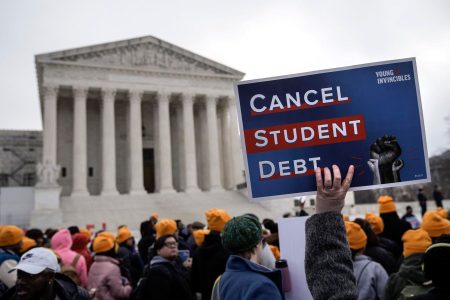The Congressional Budget Office’s latest fiscal update is filled with terrifying numbers: The projected deficit for this fiscal year will hit 7% of gross domestic product. By late 2034, the federal debt will top $50 trillion, nearly twice what it was last year. In 2034, the government is on track to spend more than 40% of all individual income taxes on interest on the debt.
And that is without extending the 2017 Tax Cuts and Jobs Act.
Confronting The Numbers
Next year, Congress and the president will have to confront these numbers in two explicit ways: First, they must address the federal government’s ability to finance that massive debt, because its borrowing authority ends on Jan. 1, 2025. Then, lawmakers must deal with the TCJA’s individual tax provisions that will expire at the end of next year.
According to recent CBO estimates, extending those individual tax cuts and a few corporate provisions would lower revenue by about $4 trillion over the next decade and increase interest costs by roughly $600 billion.
For context, that would mean that in 2034 more than half of all the federal individual income taxes will be needed to pay interest on the exploding debt.
Until we know the outcome of the November elections, it is foolish to try to predict how all this will come out. But whoever wins, those massive deficits are likely to make what will be a difficult 2025 fiscal debate even more challenging.
The Debt Limit
First comes the debt limit. Since it will expire on New Year’s Day, when Congress will not be in session, lawmakers could enact a short extension this year, say to March.
If Democrats control the White House and Congress, they could rapidly dispense with the debt limit, perhaps by abolishing it entirely.
But what if Republicans control government? Or if it is divided?
During Donald Trump’s presidency, Congress suspended the debt limit three times and he signed each bill. But in 2023, Trump urged Republican lawmakers to allow the nation to default unless President Biden agreed to “massive” spending cuts. GOP senators, led by leader Mitch McConnell (R-Ky.), rejected Trump’s idea and agreed to suspend the debt limit until 2025. Deeply divided House Republicans reluctantly went along.
It is impossible to know how Trump would respond in a second White House term. Congressional Republicans, however, likely will again be split between those pushing for steep spending reductions and those with more moderate ambitions.
One thing is for sure: A financial crisis driven by the government’s inability to pay its bills next winter would likely make it much tougher to pass a $4 trillion tax cut months later.
The TCJA’s Fate
If Democrats are in control, look for a tax bill that broadly tracks Biden’s promise to raise taxes on corporations and high-income households while avoiding tax increases for the 95% of households making $400,000 or less.
In his first term, most of Biden’s proposed tax increases died in the Senate, even though it was controlled—narrowly— by Democrats. But the two Democrats who most strongly resisted Biden’s past efforts — Senators Joe Manchin of West Virginia and Kyrsten Sinema of Arizona, both of whom now are independents — are also retiring from the Senate. And that exploding national debt could motivate some on-the-fence Democrats to back more tax hikes on corporations and the wealthy.
A GOP-controlled government may be even more unpredictable. In Trump’s first years in the White House, the federal deficit was less than 3.5% of GDP. However, legislation he signed into law, including the TCJA, added substantially to federal deficits. Then came the pandemic, when it was hard to find any lawmaker who worried about fiscal red ink.
CBO estimates this year’s deficit will be more than twice what it was when the TCJA passed in 2017, a very different fiscal environment.
Paying For Tax Cuts
As a 2024 candidate, Trump sometimes talks about not only making the TCJA permanent but also further cutting corporate tax rates. Congressional Republicans seem split. Some GOP populists may support tax hikes on corporations while other GOP lawmakers, including top Senate Finance Committee Republican Mike Crapo (R-Idaho), want to cut them.
Republicans more broadly agree on spending reductions to offset some tax cuts. But after exempting a long list of programs with strong bipartisan support, including Social Security, Medicare, defense, veterans’ benefits, and homeland security, there is relatively little left to cut.
With strong bipartisan support to extend most of the TCJA and given Congress’ usual preference for increasing spending and cutting taxes, lawmakers are likely to add even more to the nation’s massive debt when they finally tackle the TCJA, probably 18 months from now. The only question is: Will CBO’s troubling budget forecasts keep their tax cuts in check?
Read the full article here










